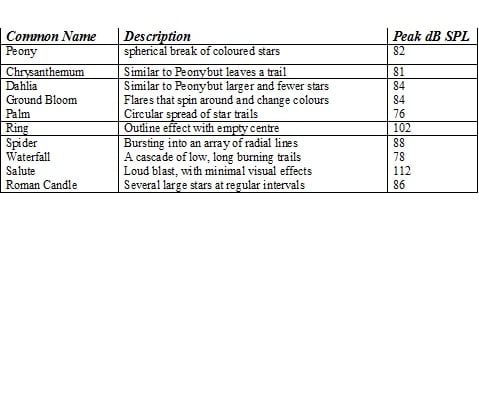On Monday we celebrated Canada Day (July 1) which is like the American July 4 except that it’s in Canada, its three days earlier, we drink Molson Canadian beer rather than some south-of-the-border brand, and it has nothing to do with independence from our colonial fathers. Canada Day is about the confederation of 4 provinces into the Dominion of Canada- we have 11 of them now. Interestingly Canada’s independence from England came about 50 years later and I will wager that nobody reading this blog will know that date. Canada essentially said that we wanted to be independent and England said OK but will you still be in the commonwealth and we said “sure, sounds good”.
Well, back to the Canada Day celebrations. With beer in one hand, and a mosquito swatter in the other hand- the mosquito is Canada’s national bird- we were all sitting about 10 meters from the fireworks display. And in my other hand I had my trusty sound level meter ready to go. I also had a dosimeter turned on, but it seemed to attract mosquitoes so some of the input was the sound of my hand swatting my neck and shoulder where it was situated, so I am not sure that it was reliable.
I was comfortably sure that my sound level meter was adequate for the task. The problem with sound level meters is that the length of time the detector needs to measure the sound must be sufficiently shorter than the rise time of the sound one is trying to measure. If I were to measure a sudden clap of my hands (25 msec from ambient sound to peak) then the sound level meter would need a detector that responds much more quickly than 25 msec. This is not an issue with a steady-state signal such as many forms of industrial noise, but it can be an issue with impulse noise such as the blast of a firecracker.
As can be observed in the table at the end of this post, the numbers ranged from the upper 70s to over 112 dB SPL.
Although some of these numbers sound loud, and indeed are loud (especially the Salute and the Ring), they are not damaging to our hearing. This is the peak sound pressure (and not the dBA measured over a period of time). If the person lighting the fireworks was stupid enough to remain close to the blast then this would be a different story and acoustic trauma might occur with the Salute. These lighters of fireworks should consider wearing hearing protection. From a distance of 10 meters (about 35 feet), however, we were all safe. And of course, these numbers would vary depending on how close you were to the actual ignition point of the fireworks.
There is a wealth of research about steady-state long-term noise exposure and our exposure models are actually quite good up to about 115 dBA. However, with exposures above that as well as impulse or blast exposures, the final word has still to be written. We just don’t have a good handle on the cochlear pathology that may result from an acoustic trauma.
There are safety regulations in a number of countries around the world, but these all have to do with minimizing burns and blasts to people’s bodies and not damaging their hearing. Given these short-
lived peaks, I would suspect that this is quite adequate.
I wish you all a pleasant and safe fireworks-filled holiday. For our American cousins, it’s just a few days off. For those in the United Kingdom Guy Fawkes day is on November 5 so you still have a bit of a wait. And for those who celebrate the Chinese new year, you will have to wait even longer.
Here is a brief list of the peak sound levels of 10 of the fireworks and their common names:







Marshall,
Thanks for this interesting post! You are absolutely correct, many times being a spectator at a fireworks display is generally going to be pretty safe. However, distance is key. If you’re the DIY type, earplugs are probably a good bet. I co-authored a pair of research papers with Greg Flamme a few years ago looking at impulse noise (firecrackers and firearms) and comparing different hearing damage risk criteria. Amazingly, we found even just a plain old basic firecracker at close range can exceed 170 dB! Of course, the farther you are from the source, the safer you will be.
Thanks Kevin:
I must admit that I was more preoccupied with avoiding mosquitoes than dwelling on meter readings, but distance is the crucial point- if you are far enough away to watch it safely, then your hearing is probably safe as well. However, if you love to be right in the fireworks area, there is a good chance that if you survive this stupidity, then your hearing may be compromised as well.